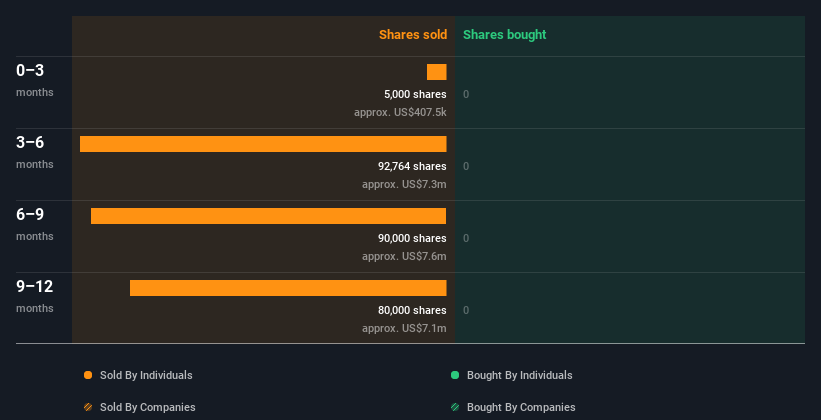Have Timken Insiders Been Selling Stock?
We'd be surprised if The Timken Company (NYSE:TKR) shareholders haven't noticed that the Executive VP, Philip Fracassa, recently sold US$408k worth of stock at US$81.50 per share. However, the silver lining is that the sale only reduced their total holding by 5.1%, so we're hesitant to read anything much into it, on its own.
View our latest analysis for Timken
The Last 12 Months Of Insider Transactions At Timken
Over the last year, we can see that the biggest insider sale was by the Director, Richard Kyle, for US$4.5m worth of shares, at about US$90.21 per share. So what is clear is that an insider saw fit to sell at around the current price of US$83.12. While we don't usually like to see insider selling, it's more concerning if the sales take place at a lower price. We note that this sale took place at around the current price, so it isn't a major concern, though it's hardly a good sign.
Timken insiders didn't buy any shares over the last year. The chart below shows insider transactions (by companies and individuals) over the last year. By clicking on the graph below, you can see the precise details of each insider transaction!

If you are like me, then you will not want to miss this free list of small cap stocks that are not only being bought by insiders but also have attractive valuations.
Does Timken Boast High Insider Ownership?
Many investors like to check how much of a company is owned by insiders. We usually like to see fairly high levels of insider ownership. It's great to see that Timken insiders own 5.6% of the company, worth about US$324m. This kind of significant ownership by insiders does generally increase the chance that the company is run in the interest of all shareholders.
So What Do The Timken Insider Transactions Indicate?
An insider hasn't bought Timken stock in the last three months, but there was some selling. Looking to the last twelve months, our data doesn't show any insider buying. While insiders do own a lot of shares in the company (which is good), our analysis of their transactions doesn't make us feel confident about the company. So while it's helpful to know what insiders are doing in terms of buying or selling, it's also helpful to know the risks that a particular company is facing. At Simply Wall St, we found 2 warning signs for Timken that deserve your attention before buying any shares.
Of course, you might find a fantastic investment by looking elsewhere. So take a peek at this free list of interesting companies.
For the purposes of this article, insiders are those individuals who report their transactions to the relevant regulatory body. We currently account for open market transactions and private dispositions of direct interests only, but not derivative transactions or indirect interests.
Valuation is complex, but we're here to simplify it.
Discover if Timken might be undervalued or overvalued with our detailed analysis, featuring fair value estimates, potential risks, dividends, insider trades, and its financial condition.
Access Free AnalysisHave feedback on this article? Concerned about the content? Get in touch with us directly. Alternatively, email editorial-team (at) simplywallst.com.This article by Simply Wall St is general in nature. We provide commentary based on historical data and analyst forecasts only using an unbiased methodology and our articles are not intended to be financial advice. It does not constitute a recommendation to buy or sell any stock, and does not take account of your objectives, or your financial situation. We aim to bring you long-term focused analysis driven by fundamental data. Note that our analysis may not factor in the latest price-sensitive company announcements or qualitative material. Simply Wall St has no position in any stocks mentioned.
Disclaimer: Investing carries risk. This is not financial advice. The above content should not be regarded as an offer, recommendation, or solicitation on acquiring or disposing of any financial products, any associated discussions, comments, or posts by author or other users should not be considered as such either. It is solely for general information purpose only, which does not consider your own investment objectives, financial situations or needs. TTM assumes no responsibility or warranty for the accuracy and completeness of the information, investors should do their own research and may seek professional advice before investing.
Most Discussed
- 1
- 2
- 3
- 4
- 5
- 6
- 7
- 8
- 9
- 10